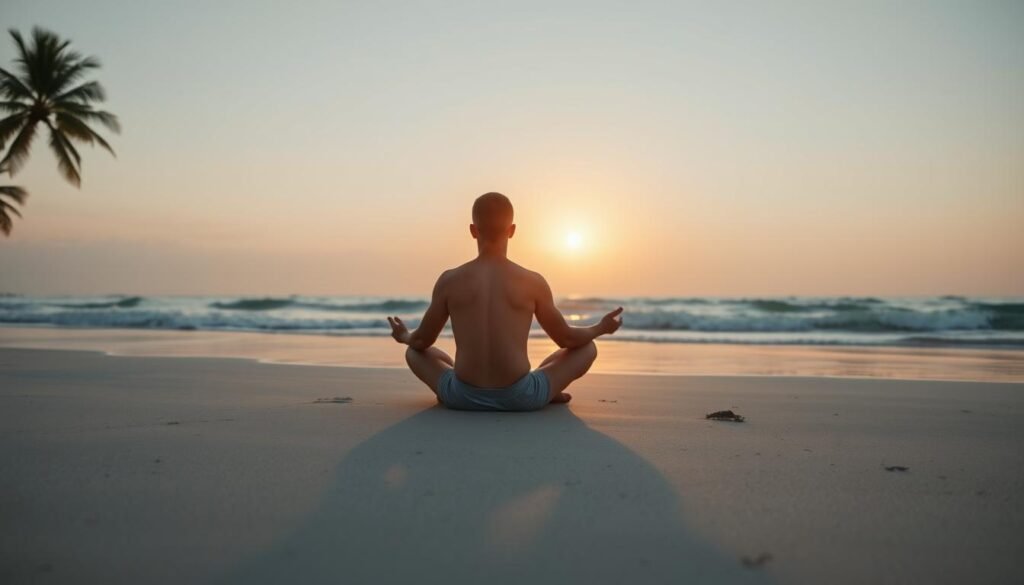Did you know that about 15.8% of people with anxiety also feel dizzy? This big number shows how many are dealing with this issue. Feeling dizzy from anxiety can really affect your day and how you feel overall. With more than a quarter showing signs of different anxiety types, learning how to stop this dizziness is key. In this article, we look at how anxiety and dizziness are linked. We’ll also share tips and ways to tackle anxiety dizziness. By knowing the symptoms and how to deal with them, you can feel more balanced and better.
Key Takeaways
- 15.8% of people with anxiety report experiencing dizziness.
- Effective treatments can alleviate anxiety-related dizziness significantly.
- Breathing techniques and relaxation exercises help reduce dizziness.
- Cognitive behavioral therapy is a proven method for managing anxiety.
- Stay hydrated and avoid stimulants to minimize dizziness.
- Dizziness can trigger anxiety, creating a vicious cycle.
- Consult a healthcare professional for severe or persistent symptoms.
Understanding the Connection Between Anxiety and Dizziness
Dizziness is often more than a brief feeling; it can signal anxiety. The anxiety connection with dizziness is complex. When people feel anxious, they might react strongly to sensations. This reaction can cause lightheadedness or a loss of balance. Stressful situations, like being in crowded spaces, may upset our balance system.
Studies show that the brain areas for dizziness and anxiety are linked. This connection creates a loop. Anxiety can cause rapid breathing, changing blood oxygen and carbon dioxide levels. This leads to dizziness. Conditions like low blood pressure or balance disorders can make this worse.
Vestibular rehabilitation is effective for anxiety-induced dizziness. This approach involves doing activities that bring on symptoms, then resting. It’s important to combine this with counseling, cognitive therapy, and sometimes medication. Targeting both the mind and body helps manage symptoms better.
Relaxation methods and reducing stimulants like caffeine can lower dizziness for some. It’s key to understand how emotions affect our bodies. Getting both physical and mental health support is vital. Coping strategies can lead to long-term improvements in health.
It’s key to use both physical and mental approaches for those affected by anxiety and dizziness. Further exploration into how anxiety causes these symptoms is useful. More information can be found here and here.
Common Symptoms of Anxiety-Induced Dizziness
Anxiety-induced dizziness shows up in many forms, causing worry when stress levels climb. Those affected might notice symptoms like:
- Lightheadedness: A common symptom where one feels faint or as if they might pass out.
- Vertigo: A sensation that the environment is spinning, leading to significant discomfort.
- Faintness: This sensation can occur unexpectedly, prompting an urgent need to sit or lie down.
- Dizziness sensations: Many report persistent feelings of unsteadiness, affecting daily activities
Knowing the signs of anxiety-induced dizziness is key. Anxiety attacks can bring on dizziness. It might last from a few seconds to months. Long-term anxiety can make dizziness worse, keeping the anxiety going.
It’s important to check with a doctor if dizziness doesn’t go away. This helps make sure there’s no other cause. Treatment might include therapy, medicine, or changes in lifestyle. These aim to ease the dizziness caused by anxiety.

How to Stop Dizziness from Anxiety
Struggling with dizziness due to anxiety can be tough. Stopping the sensation helps with recovery. Techniques that keep you grounded are key in managing dizziness caused by anxiety. When dizzy, try sitting down or lying flat to ease it. Looking at a still object can also provide grounding.
Stay away from caffeine and tobacco as they could make your dizziness worse. Keeping a diary of your symptoms helps find patterns. This knowledge lets you build strategies to stop feeling dizzy from anxiety.
Making changes in how you live can improve your health. Using a cane or making your home safer reduces the risk of falls. Talking to a therapist can deal with the anxiety that leads to dizziness. Adopting healthy habits, like eating right, staying hydrated, and getting enough sleep, aids in managing symptoms.

Causes of Dizziness During Anxiety Attacks
It’s important to know why dizziness happens during anxiety attacks. Factors such as hyperventilation, panic attacks, and not drinking enough water play big roles. They show up in different ways, affecting both your body and mind.
Hyperventilation and Its Impact
When anxious, people often breathe too fast. This makes the carbon dioxide in the blood drop, causing dizziness. The hyperventilation effects include feeling light-headed or faint and tingles in hands and feet. Knowing this helps people use slow breathing methods to feel less dizzy when anxious.
Panic Attacks and Dizziness
Panic attacks bring a lot of physical symptoms, like dizziness. The adrenaline rush during these attacks messes with blood flow, making you feel light-headed or confused. Knowing dizziness is common in panic attacks helps people find ways to handle it better.
Dehydration and Anxiety
Not drinking enough water can make anxiety symptoms worse. The impact of dehydration on anxiety is big, making dizziness and nervous feelings worse. Drinking plenty of water helps ease these issues, making stressful times more manageable.

| Cause | Effects on Dizziness | Management Strategies |
|---|---|---|
| Hyperventilation | Decreased carbon dioxide levels, leading to lightheadedness | Controlled breathing exercises |
| Panic Attacks | Adrenaline surge causing fluctuations in blood flow | Grounding techniques, mindfulness |
| Dehydration | Exacerbation of dizziness symptoms | Stay hydrated, balanced nutrition |
Quick Relief Tips for Managing Anxiety Dizziness
Feeling dizzy from anxiety can be scary. But, you can manage it with some quick relief strategies. Techniques like breathing exercises and visualization help calm the mind. They reduce the dizzy feelings. Finding what works for you gives you back control during these moments.
Breathing Techniques to Reduce Dizziness
Breathing plays a big part in easing the mind and body. Diaphragmatic breathing is one good way to do it. By breathing from the diaphragm, you take deeper breaths. This lowers anxiety significantly. Here’s how to do it:
- Find a comfy spot to sit or lie down.
- Put one hand on your chest, the other on your belly.
- Breathe in deep through your nose, making sure your belly rises.
- Breathe out slow through your mouth, feeling your belly lower.
- Keep this up for a few minutes, focusing on your breathing.
Doing these breathing exercises regularly offers quick relief from anxiety dizziness. It helps clear the mind and reduces the dizzy spells over time.
How to Use Visualization Techniques
Visualization is another great tool for anxiety. It allows you to mentally escape to a calm place. This helps shift your focus and relax. Here’s how to start using visualization:
- Shut your eyes and breathe deep a few times to settle your body.
- Picture a peaceful place, like a beach or forest, where you feel safe and calm.
- Imagine the sounds, smells, and what it feels like in this peaceful place.
- Stay with this soothing image for a few minutes, letting its calmness soothe you.
Adding visualization to your daily routine can bring great comfort during anxious times. It lessens dizziness and helps with emotional health.
Long-Term Strategies for Overcoming Anxiety-Related Dizziness
Managing long-term anxiety is key for persons dealing with anxiety-induced dizziness. Cognitive-behavioral therapy (CBT) is a powerful method for this. It guides you to alter negative thoughts that fuel anxiety.
CBT teaches challenging bad thoughts about yourself, others, and the future. This process is crucial for self-improvement.
Moreover, changing your lifestyle is also impactful. Doing regular exercise can ease tension and improve happiness. Eating well helps stabilize your mood. Also, sleeping well boosts your mental health.
All these changes aid in fighting anxiety and its dizziness effect.
It’s important to keep a balanced lifestyle. Activities that help you relax, like deep breaths and mindfulness, lower dizziness. They tackle anxiety’s physical signs. This helps you feel steadier and more in charge.
In summary, beating anxiety dizziness demands ongoing efforts to control anxiety. Through therapy, better lifestyle choices, and relaxation techniques, dizziness can become less frequent and intense. This leads to a richer life.
| Strategy | Description | Benefits |
|---|---|---|
| Cognitive-Behavioral Therapy | Therapeutic approach focused on changing negative thought patterns | Reduces anxiety symptoms, improves self-awareness |
| Regular Physical Activity | Incorporating exercise into daily routines | Boosts mood, reduces tension |
| Healthy Eating | Consuming a balanced diet rich in nutrients | Stabilizes mood, supports mental health |
| Mindfulness & Relaxation Techniques | Practices such as deep breathing and meditation | Enhances focus, lowers anxiety levels |
Physical Activity to Combat Dizziness from Anxiety
Regular physical activity is key in handling anxiety and its symptoms like dizziness. It lets out endorphins, making you feel better and offering physical activity anxiety relief. Many have found that adding exercise to their daily life cuts down on anxiety. This boosts their overall well-being.
The Role of Exercise in Anxiety Management
Exercise is a natural way to fight anxiety, easing both mind and body symptoms. It helps with quick breathing and tense muscles. The exercises designed for anxiety relief can be really helpful. For example, regular exercise can make your body react better to anxiety triggers. This gives lasting relief.
Benefits of Outdoor Activities
Being outdoors has special benefits you don’t get from gym workouts. It makes you feel peaceful and boosts your health. The outdoor activities benefits also include feeling happier and more energetic, with less anxiety. Going for a walk, a hike, or biking lets you enjoy nature and stay fit.
| Activity Type | Benefits | Frequency Recommendations |
|---|---|---|
| Walking | Enhances mood and reduces stress | 30 minutes daily |
| Hiking | Connects with nature, boosts endurance | 1-2 times per week |
| Cycling | Improves cardiovascular health, relieves anxiety symptoms | 3-4 times per week |
Professional Help and Treatment Options
Dizziness from anxiety can really change how you live. It’s important to get help to manage symptoms. Knowing when to see a doctor for dizziness makes a difference if things get worse or don’t improve.
Understanding When to Consult a Medical Professional
If you’re often feeling very anxious or dizzy, it’s time to see a doctor. You should get medical help if you experience:
- Persistent dizziness that disrupts your day
- Dizziness with bad headaches or trouble seeing
- Anxiety that makes dizziness worse
- Blacking out or fainting
Noticing these signs means it’s time to seek professional help anxiety treatment. This is the first step towards feeling better.
Medication Options for Managing Anxiety and Dizziness
There are medicines that can ease dizziness caused by anxiety. Medication for anxiety dizziness might include:
| Medication Class | Examples | Uses |
|---|---|---|
| Antidepressants | SSRIs (Selective Serotonin Reuptake Inhibitors) | They help with anxiety and mood. |
| Anti-anxiety Medications | Benzodiazepines | They quickly calm anxiety attacks. |
| Antihistamines | Dramamine, Meclizine | They lessen vertigo and nausea from dizziness. |
Treatments like Vestibular Rehabilitation Therapy are also good. They make balance better. Always work with your doctor to find what works best for you.
Conclusion
Understanding how to stop dizziness from anxiety is key for those affected by this issue. The link between anxiety and dizziness is big but often missed. Anxiety can show itself in many physical forms, including dizziness, hitting people of all ages, especially seniors.
Knowing dizziness can come from hyperventilation and other anxiety causes is empowering. It helps people to tackle anxiety dizziness upfront. To ease discomfort from dizziness during anxiety attacks, try breathing exercises and visualization techniques. Long-term methods like managing stress, staying active, and getting professional help are also effective.
It’s very important to seek professional guidance if dizziness disrupts your daily activities or keeps happening. Places like Simply Physio in Knoxville offer personalized care plans. Putting your mental and physical health first is crucial to stop dizziness from anxiety attacks and to better your life quality. Learn more about anxiety’s physical symptoms in this helpful article.